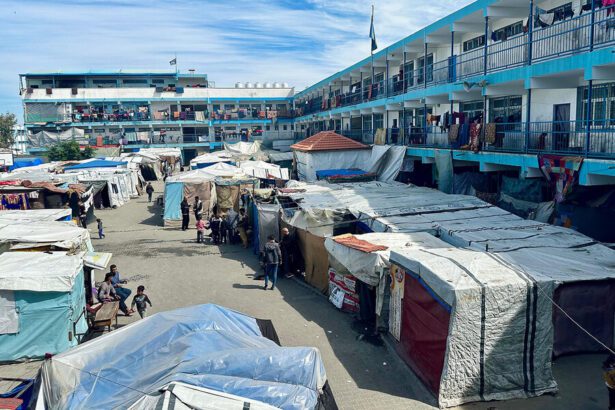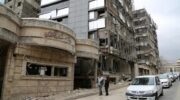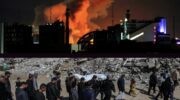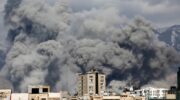The U.N. Relief and Works Agency has become known for its distribution of humanitarian aid in Gaza during the war there. But its real value lies in its schools, says the Christian Science Monitor’s Gaza reporter. If they close, what is the future for Palestinians?
If UNRWA is not there to educate the next generation of Palestinians, it could leave in its wake an uneducated and unhealthy generation, perpetuating a cycle of poverty and despair…
By Ghada Abdulfatah and Taylor Luck, Reposted from The Christian Science Monitor
When I was growing up in Gaza, my childhood was shaped by the walls of schools run by the United Nations Relief and Works Agency for Palestine Refugees in the Near East (UNRWA) painted a distinctive U.N. blue.
It was there that I learned math and science, enjoyed reading “Harry Potter” novels, picked up some computer skills, and wrote a significant number of unfinished stories while perfecting my English.
On Monday we heard that the Israeli parliament had banned UNRWA from operating in Israel. That threw into immediate doubt the health and schooling of 3 million Palestinians, including the entire population of Gaza. But I looked further into the future, wondering what tomorrow will hold for our children.
Supporters of the ban cite Israeli assertions that 19 UNRWA employees took part in Hamas’ deadly Oct. 7 assault on Israel. After an internal investigation by the U.N. Office of Internal Oversight Services, UNRWA fired 10 of them. Evidence in the other nine cases was found to be too thin to justify action.
Monday’s law would ban Israeli banks from dealing with UNRWA and prohibit any contact between the organization’s employees and Israeli officials starting in January 2025.
That would make it impossible for UNRWA teams to deliver food, medical aid, or anything else in Gaza and the Israeli-occupied West Bank, where Israeli checkpoints are unavoidable.
No matter the war or current controversy, the backbone of UNRWA is education. In Gaza, where the vast majority of residents are refugees, nearly every child goes to an UNRWA school.
I attended two UNRWA schools in my youth: one on Salah al-Din Road close to an Israeli settlement before it was dismantled in 2005, and the other in the Deir al-Balah refugee camp. For me, these schools were not just places to learn. They were vital community centers.
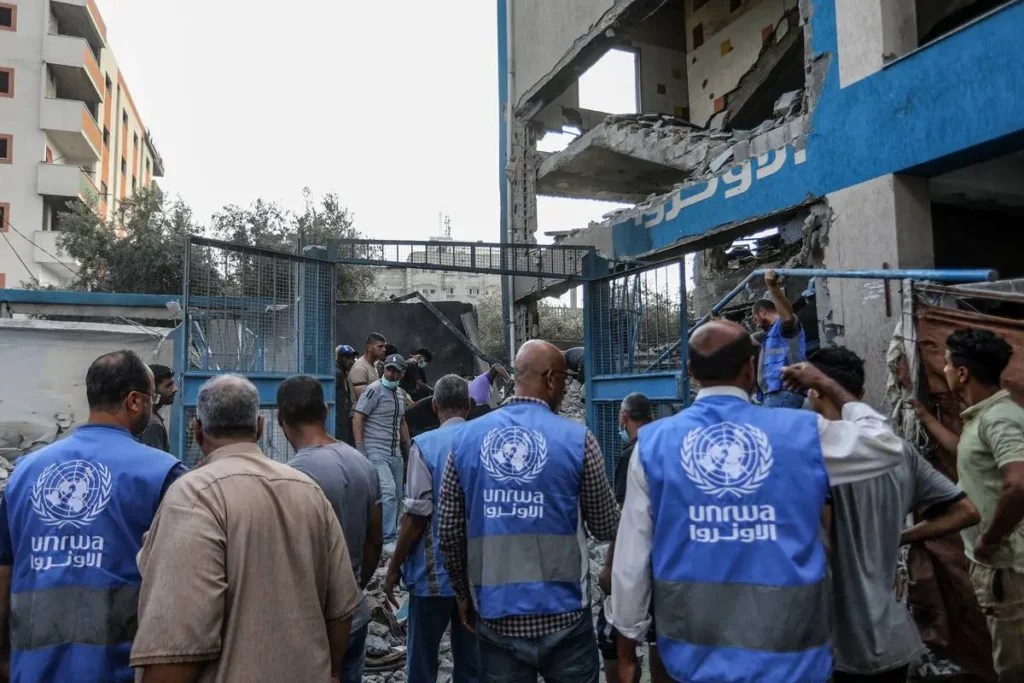
My parents, born just after 1948, when their family had fled their home in what became Israel, also attended UNRWA schools. They are members of an educated generation. They worked as teachers in Libya for nearly 25 years, teaching history, geography, and design.
They always attribute their careers to the education they received at UNRWA schools, which opened doors for them, and, later on, for me. My sister became a teacher. Many of my friends and classmates at university went on to become UNRWA teachers.
This focus on education may explain the Gaza Strip’s 96.8% literacy rate.
From flour to soap to fresh water – UNRWA had it
UNRWA’s role became broader and even more critical when the war between Israel and Hamas broke out in 2023.
Drawing on its 13,000 staff members in Gaza and dozens of facilities, it became the main source of aid in Gaza, distributing around 70% of the food, fuel, and health and hygiene kits that entered the strip.
UNRWA hands out flour and food parcels to the most vulnerable Palestinians in Gaza, providing 215,000 poor families with sacks of flour to make bread – for many their only source of calories.
I have watched volunteers deliver flour to families even amid the threat of airstrikes. It was heartening to know that, when markets were shuttered and food was scarce, some sustenance was reaching those who had lost everything.
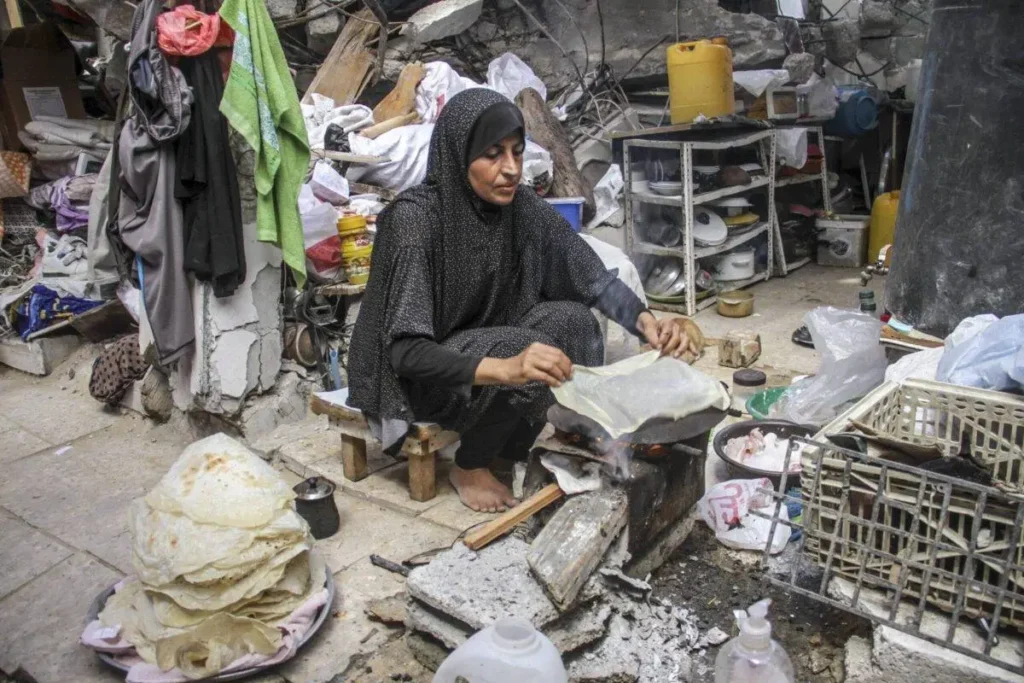
Our family, like most people in Gaza, has received food packages from UNRWA, containing flour, rice, and canned meat. For us and for our neighbors, these aid boxes have been especially valuable when the markets were practically bare and food prices were soaring.
At times, UNRWA has been our only source of soap.
Families I visited in displacement camps rely on UNRWA for their daily meal.
Seven out of UNRWA’s 27 health centers in the strip are still operational, providing primary health care, pediatric care, medicine for older people, and vaccinations for children.
When clean water has been scarce, I have watched UNRWA workers drive water trucks into displacement camps and distribute water bottles. They have also provided fuel for water desalination plants.
UNRWA schools serve as shelters
The UNRWA school I attended in Deir al-Balah, like most schools in Gaza today, has been converted into a makeshift evacuation center for evacuees. Even its library hosts families in tents among the books; some have burned books as a source of cooking fuel.
Tens of thousands of Gaza residents displaced by Israel’s military offensive now live in these schools, seeking refuge in classrooms and school courtyards in the belief that living under the U.N. flag would protect them. Israeli strikes on and near these schools, said by the Israeli military to be sheltering Hamas militants, have killed 563 people.
The agency’s employees, our friends and neighbors, continued their work as they themselves went hungry and were forced out of their homes by Israeli warnings of missile strikes. Israeli fire has killed 233 UNRWA staff members as of Tuesday.
The U.N., the United States, and international aid organizations have expressed their fears for the future of humanitarian aid in Gaza if the UNRWA ban is applied.
But my fears go beyond this war.
If UNRWA halts its services, I wonder about my nephews and nieces. Will they have the same opportunities I once had? I worry that they will lose their chance of a brighter future.
Education is not just textbooks and classrooms; it is about hope and the belief that a better life is possible. If UNRWA is forced to abandon its schools, I fear, it will leave in its wake an uneducated and unhealthy generation, perpetuating a cycle of poverty and despair.
I can’t help but feel that the little hope we have left is being taken away.
Taylor Luck is the Middle East North Africa Correspondent for the Monitor. Read other articles by Luck here.
RELATED:
- Oxfam reaction to Israel’s banning of UNRWA
- More on Israeli Atrocities: Attacking UN peacekeepers is a dangerous policy
- The most precarious place in the world to be a child: Israel’s year of war on children
- I’m a pediatrician. The scars I saw on Gaza’s children will take generations to heal.
- Human rights reports on Israel-Palestine (regularly updated)
- This school is sheltering 14,000 people in classrooms…

